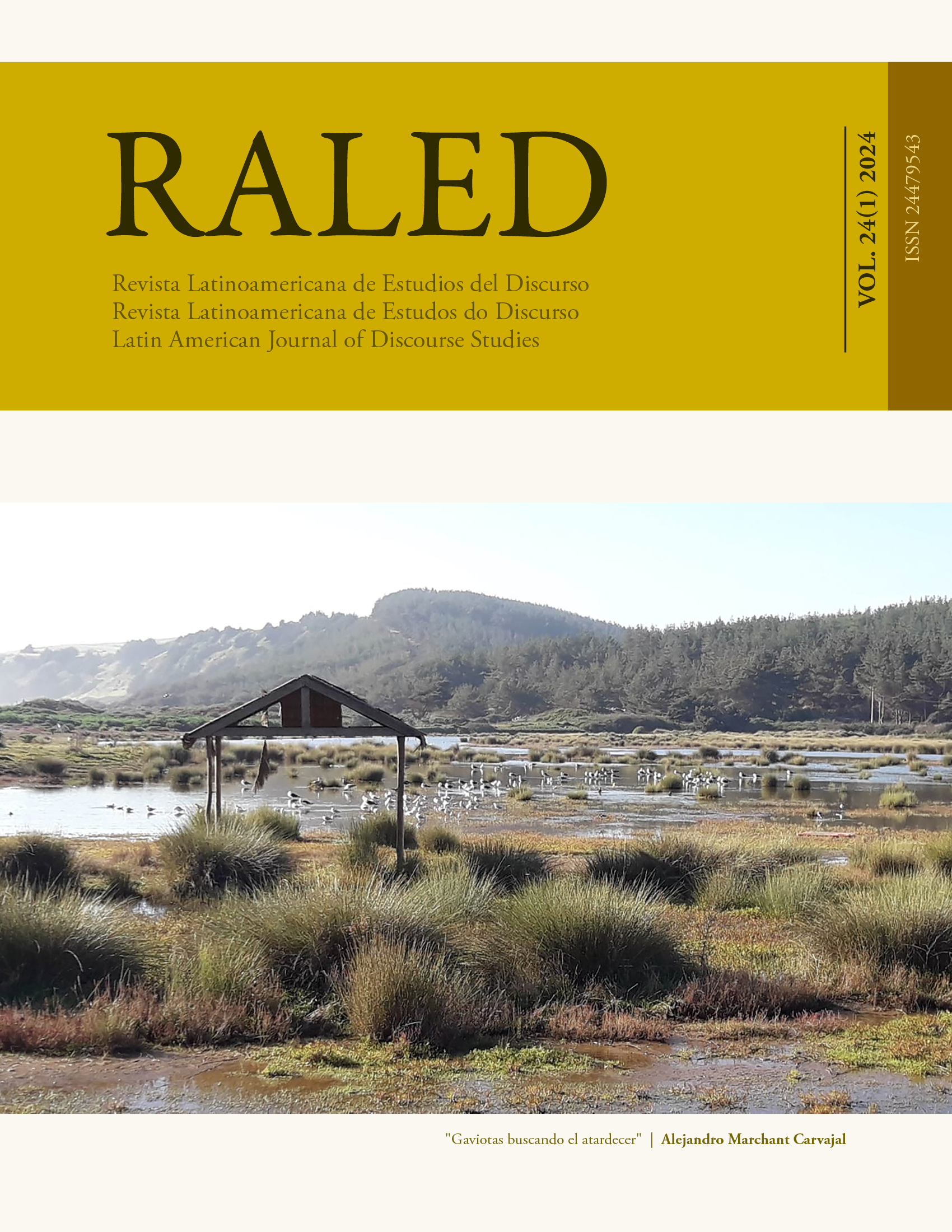Legislative discourse against non-binary language in Brazil
DOI:
https://doi.org/10.35956/v.24.n1.2024.p.142-160Keywords:
Linguagem não binária, Gênero, Projetos de lei, IndexicalidadeAbstract
This article aimed to identify the construction of meaning about non-binary gender language in Brazilian legislative texts that prohibit this linguistic use. To develop the methodology, we selected a bibliography on social gender (Cult, 2014; Miskolci, 2014, 2015; Oliveira, 2019), CDA (Fairclough, 2003) and indexicality studies (Melo & Ferreira, 2017). In principle, we read the bibliography of the references that make up the material for theoretical support and collected the corpus on publication portals for the processing of this data. Next, we identify information relating to the
production and circulation of collected data and analyze such projects in the light of an aspect of CDA, the Faircloughian approach, with the help of thinking about the indexicality category. The results showed that the performance most used to give meaning to non-binary language in the texts analyzed was to make it a monster, resorting to belittling it.
References
Bourcier, Sam. 2020. Homo Inc.orporatad. Trad. Marcia Bechara. São Paulo: N-1 Edições.
Butler, Judith . 2003. Problemas de gênero. Feminismo e subversão da identidade. Trad. Renato
Aguiar. Rio de Janeiro: Civilização Brasileira. (Coleção Sujeito e História)
Butler, Judith .1997. Discurso de ódio. Uma política do performativo. Trad, Roberta Fabri Viscardi. São Paulo: Editora da Unesp.
Câmara JR, Joaquim M. 1970. Estrutura da língua portuguesa. Petrópolis: Vozes.
Coulthard, Carmen-Rosa. 2007. Caro colega: exclusão linguística e invisibilidade. Discurso & Sociedad. V. 1(2), p. 230-246.
Cult. 2014. Dossiê Teoria Queer. Revista Cult. São Paulo. p. 33-56
Fairclough, Norman. 1992. Discurso e mudança social. Trad. Maria Izabel Magalhães. Brasília: UNB.
Fairclough, Norman. 2003. Analysing Discourse: Textual analysis for social research. Londres/Nova Iorque: Routledge.
Freitag, Raquel M. K. Conflito de regras e dominância de gênero. In: Barbosa Filho, Fábio R.; Othero, Gabriel de A. (Orgs.) Linguagem “neutra”. Língua e gênero em debate. São Paulo: Pará- bola Editorial. p. 53-72.
Halberstam, Jack. 2020. A arte queer do fracasso. Trad. Bhuvi Libanio. Recife: CEPE Editora.
Halliday, Michael e Matthiessen, Christian. 2004. An introduction to Funcional Grammar. Londres,
Edward Arnold
Kristeva, Julia. 1982. Powers of Horror: an essay on abjection. New York: Columbia University Press.
Melo, Glenda Cristina Valim de; Ferreira, Juliana Tito Rosa. 2017. As ordens de indexicalidade de gênero, de raça e de nacionalidade em dois objetos de consumo em tempos de Copa do Mundo 2014. Revista Brasileira de Linguística Aplicada. v. 17, n. 03, p. 405-427.
Melo, Iran Ferreira de. 2022. Contrabando discursivo e Linguística Queer. In: Lima, Bruno de Assis Freire de; Gomes, Maria Carmen Aires (Orgs.) Estilos e discursos. Uma contribuição para os estudos da linguagem. Campinas: Pontes, p. 17-42.
Miskolci, Richard. 2014. Um saber insurgente ao sul do Equador. Revista Periódicus. 1a edição, mai-out.
Miskolci, Richard. 2015. Teoria Queer: um aprendizado pelas diferenças. (pp. 21-35). 2 ed. Belo Horizonte: Autêntica, (Cadernos da Diversidade).
Mombaça, J. 2021. Não vão nos matar agora. São Paulo: Cobogó.
Oliveira, João M. de. O que quer o queer? Podcast Larvas Incendiadas. Disponível em: https: larvasincendiadas.com/2019/07/18/18-joao-manoel-de-oliveira-o-que-e-o-queer/. Acesso em 21 de março de 2023.
Palmo, Jtesunma Tenzin. 2014. No coração da vida. Sabedoria e compaixão para o cotidiano. Trad. Jeanne Pilli; Lúcia Brito. Rio de Janeiro: Lúcida Letra.
Downloads
Published
Issue
Section
License
Copyright (c) 2024 Iran Ferreira de Melo, Gustavo José Barbosa Paraíso

This work is licensed under a Creative Commons Attribution-NonCommercial-NoDerivatives 4.0 International License.
The authors retain the copyright and guarantee RALED the right to be the first publication of the work as well as a Creative Commons Attribution License that allows others to share the work with recognition of authorship and the initial publication in this journal.







